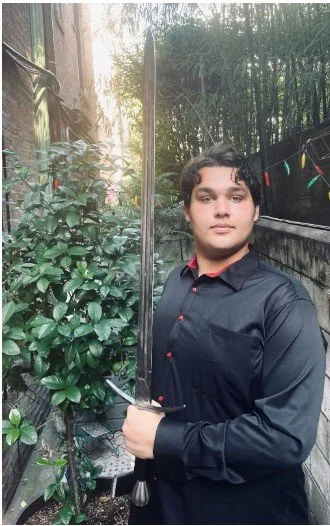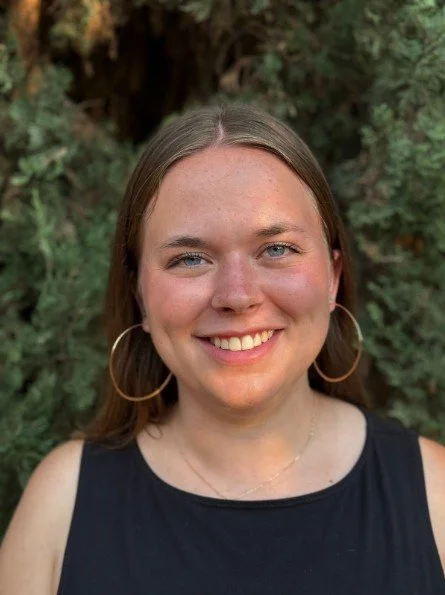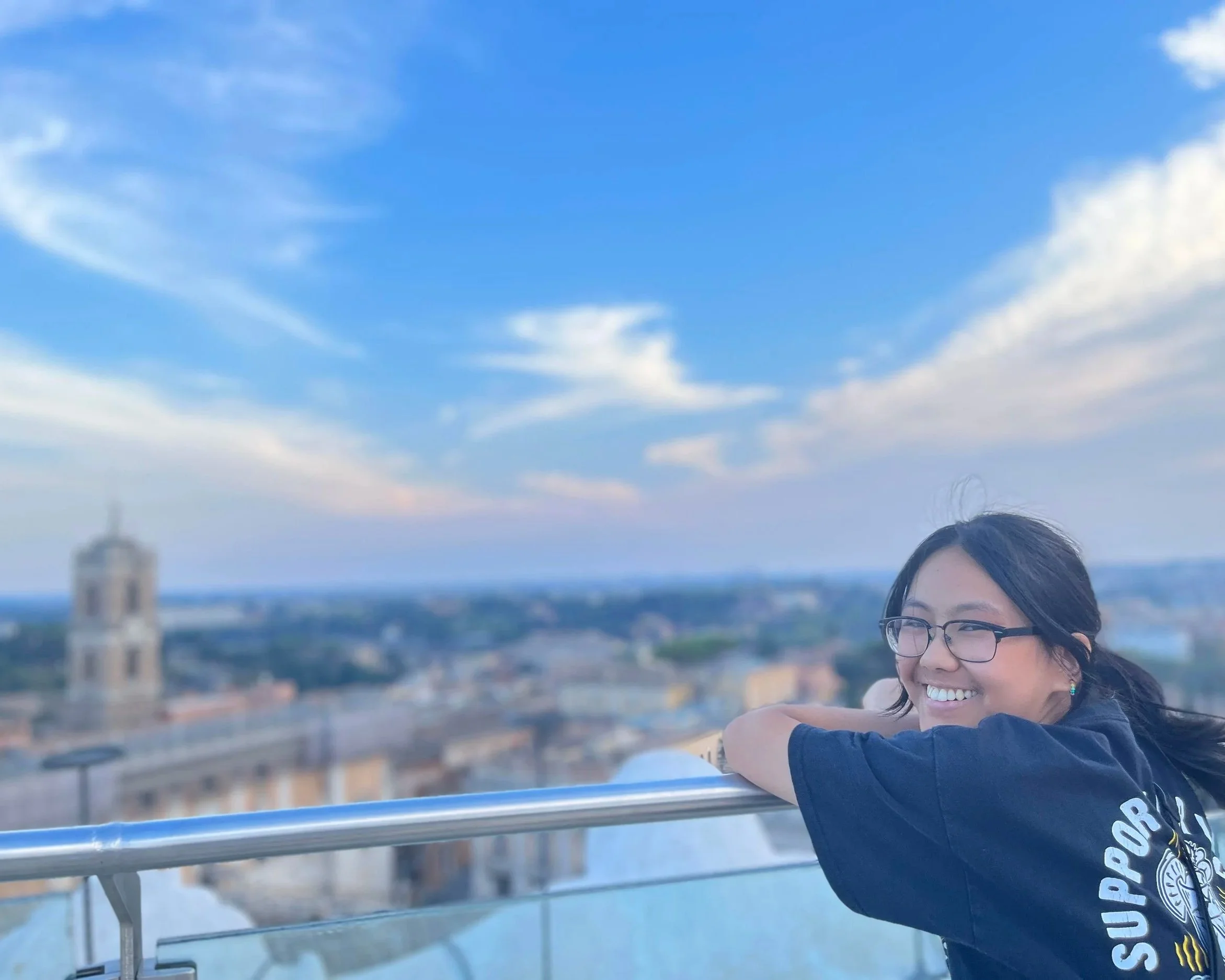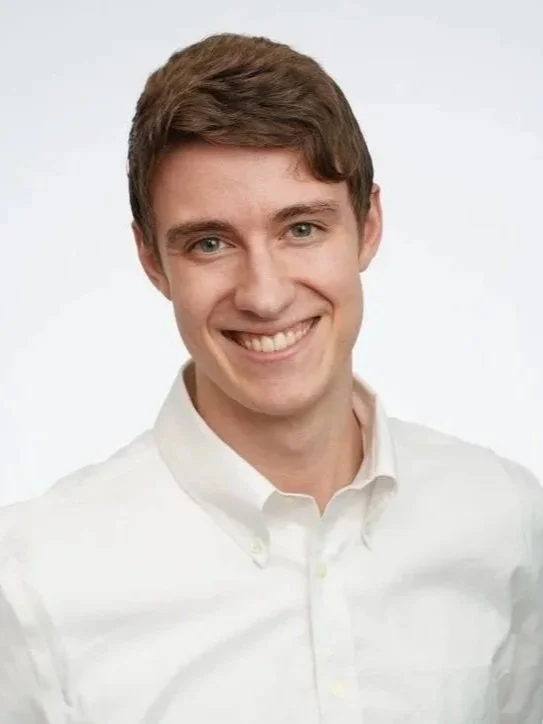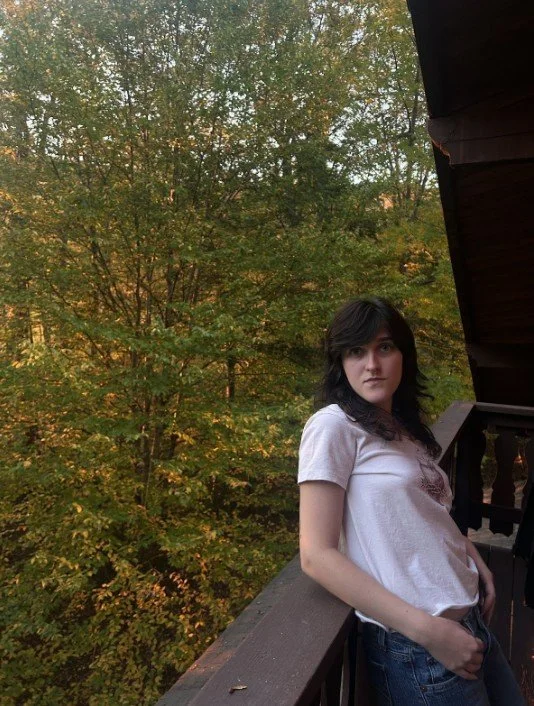Meet our Seniors
Charlotte Bishop
My primary interest lies in the study of classical literature and its intersections with art, history, and philosophy. I was first ‘truly’ drawn into the world of Classics when visiting the Titian exhibition ‘Love, Desire, Death’ at the National Gallery in London, my hometown. I was struck by the romantic interpretation in Bacchus and Ariadne, which later led me to read Catullus’s epyllion 64. The poet wrote this short epic on the golden age and the malleability of the ages: a game of what could have happened in the shadows of the past. These philosophical questions of “what if?” fascinated me and drew me toward the discipline.
What excites me about Classics is its unique breadth, uniting language, literature, art, philosophy, and history under a single field, yet its boundaries are always being stretched and tested. Currently, I am especially interested in ancient Greek tragedy. At this early stage, I am considering writing my thesis on Sophocles’ “Antigone”, exploring the concepts of selfhood, selfishness, and female agency in the reception of Jean Anouilh’s 1944 adaptation. Alongside this, as part of my dual BA with Trinity College Dublin, I am writing a dissertation focusing on the representation of tyranny in ancient drama.
Malek Elashry
I first got into classics to know how ancient militaries worked. I wanted to know the strengths and weaknesses of lorica segmentata armor, the logistics of maintaining a Roman legion or the Athenian navy, and the various tactics of the great generals. Later, I became more broadly interested in ancient society, particularly in the ancient economies that could equip and maintain such militaries. I always wanted to read the primary sources, but I never encountered Greek or Latin before I came to Columbia. Classics at Columbia has been a frontier of possibility for me in so many ways. It turned the ancient languages, which had previously been sources of intimidation for me, into sources of freedom. Looking at ancient economic institutions as they were expressed in the original languages has allowed me to start looking at them on their own terms, separate from modern assumptions about how economics should work. When I walk around the city, I can understand the lyrics of the Gregorian and Greek Orthodox chants I’ve listened to since middle school. These languages have opened up worlds for me, big and small, academic and personal, worlds I didn’t always think I’d be able to access. With the foundation that classics has given me, I hope to branch into ancient Near-Eastern languages, like Old Persian and Middle Egyptian, which I’m learning now, and Akkadian in which I hope to tackle in the future.
Anna Noelle Freeburne
My interest in Classics began at age eight, when I first read D’Aulaires’ Book of Greek Myths and was captivated by the cosmic narratives within. To this day, my initial love of stories and writing guides my academic pursuits, and my projects tend to prioritize the union of creative language with classical traditions.
My research interests include:
Latin poetics of reanimation and self-conceptions of the poet (especially in Lucan)
Reimagining classical translation as a creative practice
The “untranslatability” of power in Greco-Roman magic and ritual
Necromancy in the ancient world
The linguistics of evocation and incantation
Physical collisions of the “Pagan” and the “Christian” (in amulets, texts, spells, statues, etc.)
avery Grannan
My name is Avery Grannan. I am a senior at Barnard studying classics with a focus on the Roman world. My research interests vary but center on Roman art history and archaeology, particularly the intersections of material culture and landscape. Over the past two summers, I have gotten to explore these interests while excavating at Hadrian's Villa in Tivoli with Professor de Angelis and fellow classics, archaeology, and art history students. Additionally, in the spring of 2025 I studied abroad at the Intercollegiate Center for Classical Studies in Rome, where I was able to explore many of the sites that shaped my academic interests while studying at Barnard and Columbia. While in Rome, I also worked at the American Academy as an archaeological collection intern at the Norton-Van Buren collection. I am currently working as an architectural analyst for the Southern Etruscan Tomb Survey at the University of Michigan, where I help to document Etruscan necropoleis using LiDAR technology. Overall, I am interested in the lasting influence of classical art and architecture on our modern world and the role of archaeology in revealing and informing these conversations between present and past.
Ashley In-Nae Kim
I did not come to Columbia intending to major in classics. I didn't know who Homer was or how to find Athens on a map. I really just wanted to read the New Testament in its original language, ancient Greek (never mind that Attic and Koine are different!). It was ancient Greek—a fascinating, rigorous language—that pulled me into the broader, interdisciplinary world of classics. Classics has shaped me as a thinker and a student, especially through my most challenging courses (like Greek prose composition with Prof. Scharffenberger and the Hellenistic world course with Prof. Ma). My current interests revolve around imperial Greek literature and the relationship between Rome and Greece, especially in the second-century works of the biographer Plutarch and the ancient novelist Longus. I'm curious about how the presence and shadow of imperial Rome influenced Greek literature; why genres such as the ancient romance novel emerged; and what ancient literature can tell us about modernity.
The longer I have spent in classics, the more I have recognized just how strange the ancient world is and how much I don't know. It is a world that is altogether tragic and abhorrent, unexpectedly humorous and self-conscious, wise and timeless, and yet so very human.
Sophia Ling
My primary interests within Ancient Studies are Graeco-Roman Egypt, Roman art, and bioarchaeology. I interned at the Met in my sophomore year with the Egyptian department and became more interested in Egyptian history. I am writing my thesis on the transmission of Egyptian magic to the wider Mediterranean world during the Roman period, particularly focusing on the material culture and agents of transmission.
Outside of classics, I also double-major in Computer Science, and I'm interested in combining my two majors in some form. I work in a CS lab at Barnard, where my project is focused on rendering for a forensic archaeology project.
Riley Parker
I’m Riley Parker, a senior at Columbia majoring in Classics. I came to Classics—and to Columbia—by a roundabout route. I spent my freshman year as a film production student at the Northwestern University School of Communications, taking Latin courses just as a side pursuit. However, I soon found that the path I was on wasn’t the right one for me, and I sought a new start at Columbia. Becoming a Classics major was part of this self-redefinition, and I am thrilled that I made the choices I did. The academic rigour of Classics at Columbia has encouraged me to tackle daunting intellectual challenges that I would never have considered possible before I arrived. I once assumed that Ancient Greek was beyond my reach; now I find deep textual analysis of the language to be not just feasible for me but thrilling. I am proud of how much my translation skills have improved over the last couple of years, leading me to win the Earle Prize in Classics for Sight Translation of Greek and Latin in the spring of 2025. I have also discovered my own fascinations with the dramatic tales of ancient epic and lyric poetry, along with my passion for critically reevaluating the representations of historically marginalized or maligned people in ancient prose.
Additionally, I have developed my humanities research skills throughout my time at Columbia. In the spring of 2024, I presented a paper on ekphrasis and fugitivity in Vergil’s Aeneid—written during my first semester at Columbia—at an undergraduate conference affiliated with the NYU Society of Ancient Studies, and I presented that paper a second time at the Eta Sigma Phi panel at the annual meeting of the Society for Classical Studies in January 2025. Now, I am working on a senior thesis on imperial Roman depictions of women in warfare with Professor Kristina Milnor of the Barnard Classics Department.
I have enjoyed engaging with Classics here outside of the classroom as well. I have been involved in two Barnard-Columbia Ancient Drama productions performed in the ancient languages, including the Spring 2025 production of Sophocles’ Oedipus at Colonus. As the actor playing Oedipus, I had the time of my life interacting with a truly rich text and its themes of disability on a deep level. I am indebted to Classics at Columbia for helping shape the person I am today and demonstrating to me that I am capable of far more than I ever imagined.
Jake Harrison Richards
I came into my time at Columbia having made the implicit promise that I would spend the next three-and-a-half years setting my intellectual compass by stars other than what I took for North. A few formative brushes with Virgil and Horace early in my high school years left me with an abiding love of the Augustan poets (one I do not foresee as soon to falter); but at Columbia, I’ve expanded my primary research interests far and wide through the fields of philology and literary philosophy, particularly into Greek tragedy and lyric, Hellenistic poetry, late Republican poetry, Lucan, Seneca, and the neo-Latin of the Renaissance humanists as well as that of the British Isles in the 16th and 17th centuries. Outside of the classroom, I have been fortunate enough to work with Professor Marcus Folch (alongside fellow seniors Ari and Malek) on his upcoming book on the Ancient Greek prison. For my senior thesis, I am undertaking a comprehensive comparative study of messenger scenes in Senecan tragedy. Such a project proposes to consider Greek and Roman dramatic precedents, provide a new perspective on the uniqueness of Seneca’s characterization and use of his messengers, and understand the dramatic legacy of Senecan angeliai in the tragedies of Renaissance humanists of the trecento and quattrocento, as well as in those of the 16th century Scotsman George Buchanan.
As a double major in Applied Mathematics, I am passionate about the possibilities that the digital humanities can open for the field of Classics. In my Applied Mathematics senior thesis, I worked alongside a friend of mine to create a tool that when given any Latin poem will find all possible Latin acrostics or telestichs therein, and score them using a series of language models in order to give Classicists a mathematically-rigorous sense of the similarity of the acrostic to its surrounding context. The goal of this project (which will be made open-source for the wider Classics community to test) is to aid researchers in the discovery and delimitation of real and spurious acrostics and telestichs, inspired by D. P. Fowler’s wry comments on I. Hilberg’s 1899 list of spurious acrostics in Latin hexametric poetry (cf. Wiener Studien 21, pp. 264-305; and The Classical Quarterly 33, 1983, p. 298 for Fowler).
I have always approached classics as an opportunity to gain a sense, by way of its long recensional history, of the whence and the whither – of literature, philosophy, culture – and I do believe that the study of classics, if not in itself providing a full humanistic education, at least opens the doors thereto. Done rightly, classics offers at least a more humane education, one of attention to the self and to others: a tonic against the special ills of the 21st century. It would be impossible to articulate all I have learned from the wonderfully kind, brilliant members of this department; but I will remember my time rightly spent here very fondly indeed.
Sophia Sachar
I am a senior majoring in Classics, focusing on Ancient Greek and Latin. My studies explore mythical logic, recurring tropes, and the role of women in Classical literature. I am currently working on my thesis, which examines how mythical Desire operates within these tropes and the ways it shaped real-life reenactments in the Classical world.
Sydney J Smith
I chose to study Classical and Ancient Civilization because of my deep interest in Greek and Roman culture, alongside my love of reading and writing. At Columbia, I have found my major to be enriching both in Classics classes and in my application of knowledge outside Classics. Participating in the Trinity College Dublin Dual BA has also enabled me to reap the benefits of two wonderful Classics departments, one more history-focused and one more theoretical, that have complemented one another. I am currently pre-law, and I feel as if my studies have well prepared me for this future!
I have been able to participate in an underwater archaeological excavation in Nessebar, Bulgaria, as well as a museum studies program in Athens. My experience has been amazing, and I am eager to pursue writing two theses this year to finish my degree!
Lee Thompson
My name is Lee Thompson, and I am currently in my Senior year at Columbia School of General Studies. Before entering Columbia, I pursued and graduated with an Associate of Arts Degree at the College of Dupage. Inspired by an accumulation of personal interests, I have decided to major in Classical Studies with a focus on the Greek language. My current focus is on my senior thesis. This will explore how scents and fragrances and their complex associations with particular magic and ritualistic practices influenced the public perception of groups within Ancient Greece. Alongside my academic pursuits, I am an Illustrator for the Columbia Undergraduate Classics Journal, where we explore and publish topics within antiquity. I find myself inspired by Ancient Greek Tragedies and Epics such as Antigone, The Iliad, and Medea.
Ari Yao
My reasons for choosing to major in Classics have admittedly changed many times over the last few years. Beginning with an interest in mythology and the Latin language before I came to college, I did not really know what to expect of majoring in Classics—or even of being a college student—apart from a vague idea that I would improve my linguistic abilities, read classical texts important to the history of literature, and work towards becoming a better writer. Looking back, this was a very lackluster picture of what Classics has come to mean to me. Studying Classics has shown me the importance of multidisciplinary work and how to deal with complex, fragmentary, and contradictory histories. In the process of working to understand and challenge the narratives presented within/about antiquity, I found new interests in performance studies, public humanities, and queer studies. My recent Classics-related projects have included: doing hair and makeup for Oedipus at Colonus (2025) by the Barnard Columbia Ancient Drama Group (BCAD); starting a joint Classics/Comparative Literature senior thesis about Ong Keng Sen’s Korean operatic interpretation of Euripides’ Trojan Women, a research topic which began through the Humanities Research Scholars Program (2024) with the guidance of Professor Kakkoufa, my thesis advisor; and, alongside fellow Classics majors Malek and Jake, working as a research assistant to Professor Folch on his upcoming book curating a history of incarceration in the Ancient Greek world. This past summer, supported by the Commager Fund, I worked on creating an anthology of English translations of Hellenistic poems selected from the Greek Anthology and the Garland of Philip, focused on centering queer subjects and queer methodologies of translation. Utilizing archival resources mainly at Columbia’s Butler Library and the New York Public Library’s research and print collections, the project’s main goals are to present the history of epigram scholarship as inseparable from scholarly ideas about gender and sexuality, demonstrate the necessary impact of queer perspectives in translation practice, and explore translation as a major medium of public interaction with Classics. Classics has led me in so many unexpected directions, from falling in love with drag through BCAD’s Helenephoria (2023) to traveling abroad for the first time to study at the Intercollegiate Center for Classical Studies in Rome (Fall 2024). I look forward to seeing where my last year as an undergraduate Classics student takes me—wherever that may be!
Alicia Zhang
My interest in Classics stems from my initial love for the Latin language. Since middle school, I’ve delighted in parsing grammatical structures, breaking down rhetorical devices, and piecing together clauses in translation. Now at Columbia, my Latin classes continue to be a highlight. I’ve been able to read beyond the lines, incorporating philosophical and historical context to reveal subtleties in the text. This process of discovery has reinforced my Classics interest, elevating my initial passion for translation into an appreciation for the people, thoughts, and cultures of the ancient Mediterranean.
My academic focus mainly unites my personal interests with Latin literature. As a hiking enthusiast, I am drawn to the ancient appreciation and portrayal of nature. Similarly, my admiration for 1800s landscape painting drives my interest in rusticity, Romanticism, and reception. I hope to explore these themes through my senior thesis, analyzing Horace’s Odes and bridging millennia to relate paintings to poems.
Classics has allowed me to grow as a reader and a thinker, instilling valuable skills that I can’t wait to transfer to my future pursuits. I’ve developed key critical thinking skills, whether finding connections between disparate works, challenging and interacting with decades of scholarship, or forming an understanding of the ancient world with incomplete information. Graduating with a Columbia Classics degree may provide closure for eleven years of Latin, but I know that I will carry the analytical skills, constant curiosity, and life lessons of Roman poets with me wherever I go.

